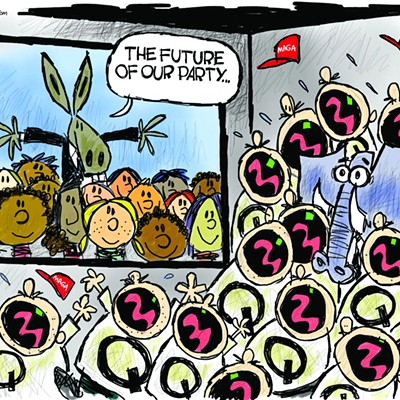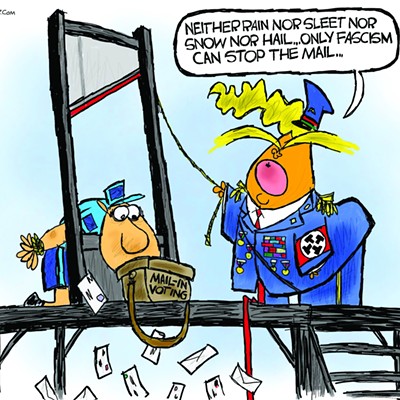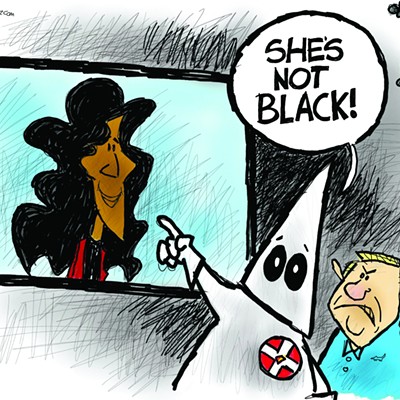A poll released last week by KVOA Channel 4 showed the race to be neck-and-neck.
Walkup, a former Raytheon executive, has based his re-election platform primarily on his boundless optimism--Tucson, he says, is the "best city in America"--and a slim-on-details plan to transform the local political landscape by merging the city and county bureaucracies into one streamlined metro government.
A professor in the UA's political science department who served 10 years on the City Council before winning one term at mayor from 1987 to 1991, Volgy has countered with a platform promising to do a better job at caring for Tucson's neglected by reversing recent fee increases in programs for children and seniors. He wants to explore an experimental health care "credit union," develop new partnerships to boost local schools and tackle poverty problems.
But both platforms have been largely overshadowed by two other stories on the campaign trail: the transportation propositions on the ballot and an independent campaign committee that has run a hard, negative campaign against Volgy and fellow Democrat José Ibarra.
The candidates have split on the transportation props, which would raise the sales tax and a construction tax to expand the bus system, create a light-rail system down Broadway Boulevard and South Sixth Avenue and repair residential streets. Walkup, whose own transportation plan was rejected by seven out of 10 voters last year, opposes the plan, while Volgy supports it, although he says it's only part of the solution to Tucson's transportation challenges.
The independent campaign committee, Independent People Like You, revealed a secret buried in campaign finance reports last week. Although the front man of the committee, funded with some $66,000 mostly from developers and car dealers, is Bruce Ash, the committee has tapped the political consulting firm Jamestown Associates.
Jamestown's local senior vice-president is George Gobble, who helped defeat Volgy when he challenged Congressman Jim Kolbe in 1998. Gobble, no doubt, was able to dust off those old opposition research files when the time came to put together the negative mailers, which cost just under $11,000, according to the finance report.
For Democrats, the election is a chance to regain ground lost in recent years. With three Democrats to every two Republicans, Dems have a built-in advantage.
But Republicans have nonetheless triumphed in every open seat since 1997, when Republican Fred Ronstadt won his underdog victory. Two years later, Walkup grabbed the mayor's seat; in 2001, Ronstadt and Republican Kathleen Dunbar beat two Democratic opponents.
Republicans have capitalized on their ability to get eastside voters to the polls, while Democrats have struggled to get westside and southside voters to cast ballots. The GOP has been particularly effective at getting votes in the bank through early ballot efforts.
New Pima County Democratic Party Chairman Paul Eckerstrom has turned some of that around already. When the deadline for early ballot requests arrived last Friday, Oct. 24, 17,448 Democrats had requested early ballots, while just 13,962 Republicans had asked to vote by mail. In total, a record 35,424 early ballots were in play.
But boosting early ballot requests is one thing; getting people to return them is another. That race is a lot closer. As of Monday, Oct. 27, 7,271 Democrats had returned their early ballots, compared to 7,204 Republicans. In all, about 41 percent of the early ballots had been cast.
VOTERS WILL NOT just be deciding the mayor's race. Among the other items on the ballot:
· In Ward 1, incumbent Ibarra is attempting to fend off a challenge from Republican Armando Rios.
· In Ward 4, incumbent Democrat Shirley Scott is facing Republican Mike Jenkins.
· Props 200 and 201 ask voters to raise the sales tax by three-tenths of a cent and increase the construction sales tax to fund a package of transportation projects, including more buses, a light-rail system and repair of neighborhood streets.
· Prop 100 asks voters to increase the mayor's pay from $42,000 to $55,000, while council members would get a boost from $24,000 to $32,000.
Polls are open from 6 a.m. to 7 p.m. on Tuesday, Nov. 4. Voters who have failed to send in early ballots can drop them off at any polling place.
For more information, visit the Tucson Weekly's online archives at www.tucsonweekly.com or the city's election Web site at www.cityoftucson.org/clerks.

















